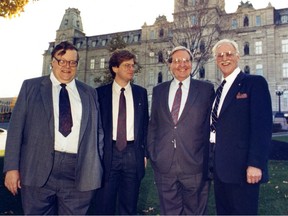While anglo angst persists, the political circumstances today are very different for minority-rights groups.

But can history repeat itself for a minority-rights party to make any headway?
The separatist Parti Québécois was the only alternative in the National Assembly, so we felt we could capitalize — though we still had to tirelessly explain that voting for Equality in federalist ridings would not split the vote and indirectly help the PQ.
We also had to counter admonitions by the anglo community establishment that the cause would be better served by politicians working from within the Liberal party. We believed that strategy had failed, and it was critical at that moment in time for the community to stand up.
We felt a new political vehicle was the best way to send an unequivocal message, and considerable legwork was required in the year before the election to build organizations at the riding level to ensure we got the vote out. We, in fact, never expected to be elected. But the grassroots community was really angry and responded overwhelmingly.
On election night, the shock waves prompted some francophone opinion leaders to recognize that maybe the government had gone too far, and a few years later the Liberals actually decided not to renew the notwithstanding clause and walked back the provisions of the language law that got us elected.
But for a party like the CaPQ to succeed, they cannot rely solely on anger or protest. They must redefine the narrative, by better linking the language issue and nationalism to its impact on everyone’s economic well-being. Montreal, largely due to our provincial politics, has suffered for generations. Voters of all languages are exasperated. Whenever I’ve broached the subject of a new economic paradigm for Montreal — recognition as a “city-state,” for example — where bilingualism and openness are embraced and not shunned, there has been significant reaction and interest.
It won’t happen tomorrow, but a discourse that starts now — giving hope about a different model and relationship between Quebec and Montreal — is an avenue for a young party to explore and potentially distinguish itself.
In 35 years from now, hopefully it will have made a difference.